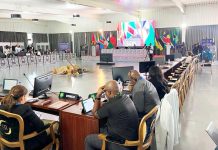PRESIDENT Ali Mohammed Shein on Friday challenged the Southern African Development Community (SADC) to devise effective strategies against disasters, saying the bloc was prone to the devastating impacts of calamities.
Dr Shein said well-articulated regional programmes against disasters were inevitable, taking into account that already SADC member states have suffered substantial social and economic losses due to the impacts of various tragedies.
“We have already seen disturbing catastrophes, which cost human lives and destroyed properties and infrastructure in our countries,” President Shein told the first ever meeting of the SADC committee of ministers responsible for risk management on the outskirts of Zanzibar city.
Quoting statistics from the implementation of “Sendai Strategy,” Dr Shein said between 2015 and 2018, the SADC region suffered over 160 disasters, which claimed over 20,000 lives and affected 22 million people.
The calamities subjected the bloc to great damages, estimated at 3.7 billion US dollars (over 8.6tri/-), said the president.
“The worst impacts of disasters are not solely in the money spent but the calamities too have huge psychological effects to the affected communities,” Dr Shein pointed out, stressing the need for SADC members to draw strategies to identify and alleviate adversity indicators before they strike.
He added: “And, we the islanders, are more prone to the impacts of calamities,” President Shein said, reminding the committee of their obligation to give guidance on the most effective actions at national and regional levels to help SADC member states to protect themselves against the fatal Corona virus, which is already troubling the world.
Quoting statistics from the implementation of “Sendai Strategy,” Dr Shein said between 2015 and 2018, the SADC region suffered over 160 disasters, which claimed over 20,000 lives and affected 22 million people.
The calamities subjected the bloc to great damages, estimated at 3.7 billion US dollars (over 8.6tri/-), said the president.
“The worst impacts of disasters are not solely in the money spent but the calamities too have huge psychological effects to the affected communities,” Dr Shein pointed out, stressing the need for SADC members to draw strategies to identify and alleviate adversity indicators before they strike.
He added: “And, we the islanders, are more prone to the impacts of calamities,” President Shein said, reminding the committee of their obligation to give guidance on the most effective actions at national and regional levels to help SADC member states to protect themselves against the fatal Corona virus, which is already troubling the world.
The head of state also challenged the meeting to deliberate on the recent locust peril, which is threatening the agricultural sector and food security in the East African region.
“This meeting is of great importance because all of you have capacity and influence in incorporating issues of disaster management in your countries’ development and sectoral programmes,” said Dr Shein, hinting that Zanzibar had devised various strategies against disasters.
He cited the 2011 national policy on disaster management, the legislation on disaster management and establishment of disaster commission as some of the government initiatives to mitigate the impacts of calamities.
Other anti-disaster strategies, Shein said, include establishment of Maruhubi-based Emergency Operations and Communication Centre, procurement of modern marine transportation vessels, and the programme for preparedness and control of disasters at national and district levels.
Minister of State in the Prime Minister’s Office, Policy, Parliament, Labour, Youth, Employment and People with Disabilities Jenister Mhagama said SADC member states have suffered huge social and economic losses due to various disasters, which had hit the bloc.
She cited the impacts of Idai and Keneth cyclones, which hit Mozambique, Zimbabwe, Comoro and Malawi last year, subjecting the countries to substantial sufferings.
SADC Executive Secretary Dr Stergomena Lawrence Tax said the region had over the past three years experienced increased incidences of cyclones, torential rains and floods, noting that 13 cyclones systems were observed in south-western Indian ocean basin in 2019, with Idai being the most devastating.
“The heavy rains and strong winds from cyclone Idai led to flash flooding, killing hundreds of people, massive destruction of property, infrastructure and crops,” reminded Dr Tax.







